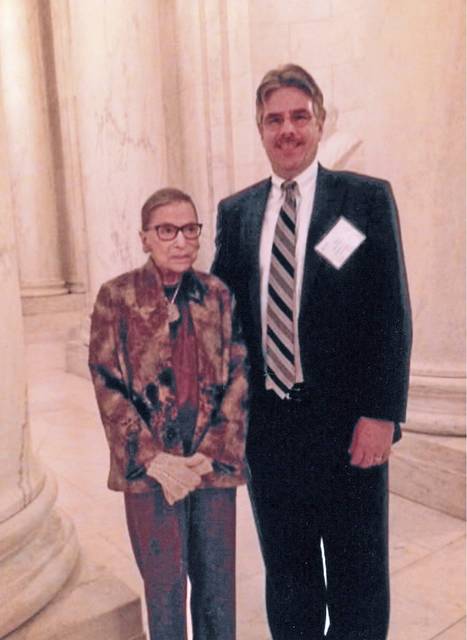For those who never met Supreme Court Justice Ruth Bader Ginsburg, the intense, demure and small woman behind the large glasses might have appeared to be someone who was not easy to approach.
Quite the contrary, said Duquesne University President Ken Gormley.
“She looked so serious. She looked kind of like a schoolmarm or something, but she was so kind and had a great warmth to her and also a sense of humor,” Gormley said.
Gormley attended Harvard Law School with Justice Ginsburg’s daughter, Jane, in the 1970s. In the years since, Gormley corresponded with Ginsburg and occasionally visited with her in person.
Ginsburg died Friday of complications from metastatic pancreatic cancer. She was 87.
As he reflected on her life and accomplishments, Gormley shared several memories of personal encounters with Ginsburg.
In 2018, Gormley was organizing a national conference on the First Amendment at Duquesne. He invited Ginsburg to participate.
“She wrote me this funny note that she was too busy being ‘The Notorious RBG,’ because, at that point, she had become kind of a rock star.”
Ginsburg had been memorably dubbed the “The Notorious R.B.G.” by a law student, a reference to the late Brooklyn-born rapper The Notorious B.I.G., a moniker Ginsburg got a big kick out of.
She told Gormley she would record a short video and send it to him. A week later it arrived and featured Ginsburg talking about how the First Amendment established the bedrock of all other rights under the Constitution.
“The fact that she did that thing, she’s on the Supreme Court, she’s in her 80s, she’s now becoming an iconic figure and they’re doing movies about her,” Gormley said. “But, because I was her daughter’s friend, she went to great lengths to do that for us, which was just remarkable. It added significantly to the program at Duquesne.”
Gormley interacted with Ginsburg on several occasions, including one memorable visit with her at the Supreme Court.
“As soon as I introduced myself and told her I was in her daughter’s class at Harvard Law, she started to fill me in and said, ‘Did you know that Larry Vilardo just got appointed to a federal judgeship and did you know that this person had a baby?’ I just found it hilarious that she was telling me things about my classmates that I didn’t know. She was totally into it.”
Unlike Gormley, David Harris, a law professor at the University of Pittsburgh, never met Ginsburg but had an opportunity to hear her speak last January at the annual meeting of the Association of American Law Schools in Washington.
“Though she seemed kind of small and looked frail, she was full of life,” said Harris. “She did not in any sense seem like a person that was at the end of her life. She had just been released at that point from another round of cancer treatments. She was optimistic about her future.”
Harris said he was in awe of Ginsburg’s lifelong strength and determination in the face of the “three strikes” she had against her when she graduated from Columbia Law School in 1959 — being a woman, a mother and a Jew.
“She came out of Columbia as one of the best graduates in the United States and could not get a law firm job in New York. She was locked out of all the big firms because they simply wouldn’t hire women with families. But she didn’t accept what was in front of her. She used her life and her professional energy to correct that injustice. She figured out a way to really change things.”
Ginsburg’s influence on the law was felt when she wrote the Supreme Court’s 7-1 opinion declaring that the Virginia Military Institute could no longer remain an all-male institution. Her opinion in the 1996 case reflected her lifelong passion as a leader on the issue of women’s rights.
“Reliance on overbroad generalizations … estimates about the way most men or women are, will not suffice to deny opportunity to women whose talent and capacity place them outside the average description,” Ginsburg wrote.
Harris called Ginsburg the Thurgood Marshall of women’s legal rights.
“In terms of gender equality, she was a giant.”
Rona Kaufman, associate professor of law at Duquesne and chair of the Women in Legal Education section of the Association of American Law Schools, said she took her daughter to hear Ginsburg speak last January.
“She is one of the most important women when it comes to women’s rights in the history of our country,” said Kaufman. “The ways in which I have been inspired by Ruth Bader Ginsburg is not just because she is a woman and not just because she’s a lawyer but because she’s also a Jewish woman inspired by her Jewish values as am I. I don’t know that I could be more inspired by her. I think of her as the first woman on the Supreme Court to really stand up for women’s rights. It’s such a great loss.”
Gormley summed up the essence of Ginsburg calling her an elegant lady.
“She was disarming. She got along with everyone. There was something very elegant about this teeny little lady and formidable. She didn’t sleep, she just worked, worked, worked and consequently she just literally transformed our country by her dogged persistence of making sure that women received equal rights under our constitution.”








